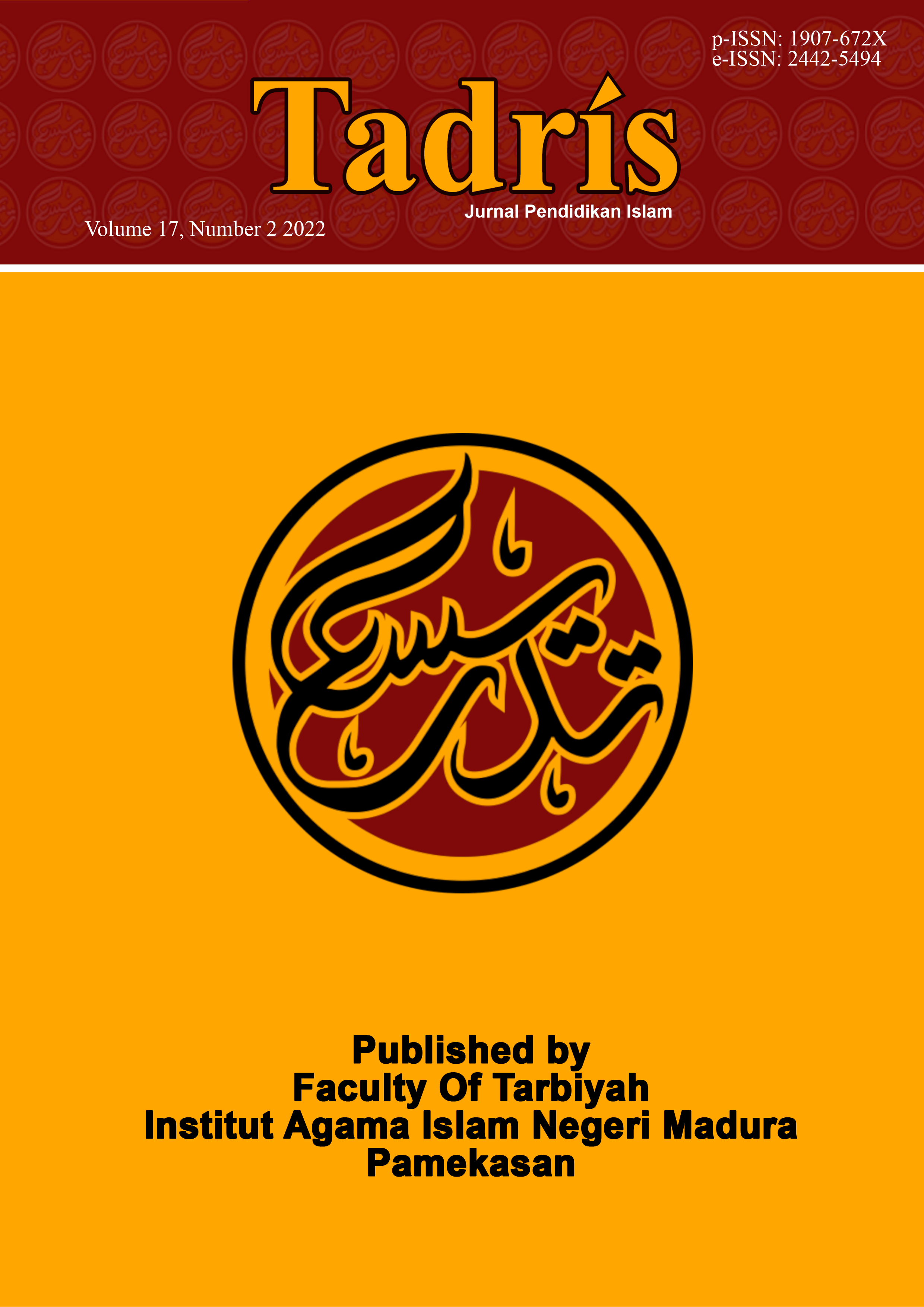Development of a Moderation-Based Islamic Education Learning Model in Efforts to Strengthen Student Tolerance at Public Universities in Lampung and Banten Provinces
 Abstract views: 394
,
Abstract views: 394
,
 PDF downloads: 233
PDF downloads: 233
Abstract
The Indonesian nation is a large nation that has very diverse ethnic groups, races, cultures, and religions. This diversity will be very dangerous if it is not addressed properly by its adherents. Conflicts of religion, ethnicity, become something that cannot be avoided when every society does not have a strong attitude of tolerance. Islamic education as an educational system has a moral responsibility in order to form a moderate society in an effort to strengthen the tolerance attitude of students through the learning model that it provides. This study seeks to uncover and analyze the development of Islamic education based on religious moderation in an effort to strengthen student tolerance in public universities in the provinces of Lampung and Banten. The research method used in this study is research and development design, namely research used to produce certain products and test the effectiveness of these products. The results of this study indicate that moderation-based PAI learning has a major role in the formation of student tolerance attitudes in public universities in the provinces of Lampung and Banten. PAI learning based on religious moderation has a strong commitment to instilling multicultural values into students so that they can respect the appeasement that occurs in the community. The results of the Development of Islamic Religious Moderation-Based Learning Model for students show that the PAI learning model can significantly increase students' religious tolerance. Therefore, the development of this learning model is highly recommended to be applied in the context of public universities, especially in the provinces of Lampung and Banten because they have a strong contribution to produce students who have a high tolerance attitude.
Downloads
References
Alfitriani, Anur, Teguh Erawati, and Suyanto Suyanto. “Pengaruh Idealisme, Relativisme, Pendidikan Etika Bisnis, dan Love of Money Terhadap Persepsi Etis Mahasiswa Akuntansi Tentang Krisis Etika Akuntan (Studi Kasus pada Mahasiswa Akuntansi UST).” INVOICE: JURNAL ILMU AKUNTANSI 3, no. 2 (September 30, 2021): 258–84. https://doi.org/10.26618/inv.v3i2.6031.
Alwi, Hasan. Kamus Besar Bahasa Indonesia. Jakarta: Balai Pustaka, 2008.
Anwar, Rosyida Nurul, and Siti Muhayati. “Upaya Membangun Sikap Moderasi Beragama Melalui Pendidikan Agama Islam pada Mahasiswa Perguruan Tinggi Umum.” Al-Tadzkiyyah: Jurnal Pendidikan Islam 12, no. 1 (July 11, 2021): 1–15. https://doi.org/10.24042/atjpi.v12i1.7717.
Aziz, Abdul, and Najmudin Najmudin. “Moderasi Beragama Dalam Bahan Ajar Mata Kuliah Pendidikan Agama Islam (PAI) di Perguruan Tinggi Umum Swasta (Studi di STIE Putra Perdana Indonesia Tangerang).” Jurnal Pendidikan Karakter JAWARA (Jujur, Adil, Wibawa, Amanah, Religius, Akuntabel) 6, no. 2 (December 1, 2020). https://jurnal.untirta.ac.id/index.php/JAWARA/article/view/9778.
Baidhawy, Zakiyuddin. Pendidikan Agama Berwawasan Multikultural. Jakarta: Erlangga, 2005.
El-Saghir, Khalil. “From Multicultural Education Advocacy to Social Justice Quest: Sonia Nieto’s Ideas and Thoughts,” May 16, 2015. https://doi.org/10.13140/RG.2.1.1342.3527.
Hantono, Dedi, and Diananta Pramitasari. “Aspek Perilaku Manusia sebagai Makhluk Individu dan Sosial pada Ruang Terbuka Publik.” Nature: National Academic Journal of Architecture 5, no. 2 (December 28, 2018): 85–93. https://doi.org/10.24252/nature.v5i2a1.
Jannah, Faridahtul, and Ani Sulianti. “Perspektif Mahasiswa Sebagai Agen of Change Melalui Pendidikan Kewarganegaraan.” ASANKA: Journal of Social Science and Education 2, no. 2 (September 30, 2021): 181–93. https://doi.org/10.21154/asanka.v2i2.3193.
Malik, Ariq. “Membangun Nilai-Nilai Toleransi Antar Umat Beragama dan Pluralisme dalam Film Aisyah Biarkan Kami Bersaudara.” Copi Susu: Jurnal Komunikasi, Politik & Sosiologi 3, no. 2 (September 30, 2021): 1–9.
Rosyid, Abdul. “Moderasi Beragama di Lingkungan Tinggi Keagamaan.” Tarbawi : Jurnal Pemikiran dan Pendidikan Islam 5, no. 2 (August 24, 2022): 101–10. https://doi.org/10.51476/tarbawi.v5i2.388.
Sugiyono. Metode Penelitian Kuantitatif, Kualitatif, R & D. Bandung: CV Alfabeta, 2017.
“Undang-Undang Dasar Negara Republik Indonesia Tahun 1945,”
Copyright (c) 2022 TADRIS: Jurnal Pendidikan Islam

This work is licensed under a Creative Commons Attribution-NonCommercial 4.0 International License.
The journal operates an Open Access policy under a Creative Commons Non-Commercial 4.0 International license. Authors who publish with this journal agree to the following terms:
- Authors retain copyright and grant the journal right of first publication with the work simultaneously licensed under a
 Commons Attribution-NonCommercial 4.0 International License
Commons Attribution-NonCommercial 4.0 International Licensethat allows others to share — copy and redistribute the material in any medium or format, and adapt — remix, transform, and build upon the material.
- Authors are able to enter into separate, additional contractual arrangements for the non-exclusive distribution of the journal's published version of the work (e.g., post it to an institutional repository or publish it in a book), with an acknowledgement of its initial publication in this journal.
- Authors are permitted and encouraged to post their work online (e.g., in institutional repositories or on their website) prior to and during the submission process, as it can lead to productive exchanges, as well as earlier and greater citation of published work (see The Effect of Open Access).














